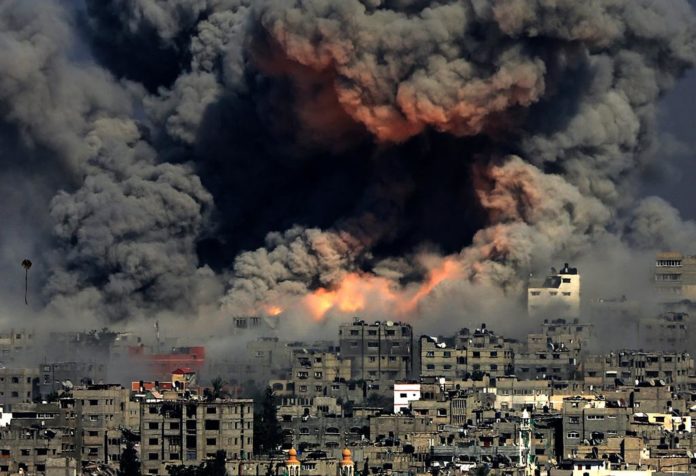Some commentators and politicians describe the situation as “Gaza in Flames.” Others, including Jeremy Corbyn call it “live genocide.”
No definition is enough to underline the gruesome nature of the Israeli aggression against hapless Palestinians.
I would say the entire “rule of law and the democratic order” regime that originated in the aftermath of the second world war 11 is in flames. Every day it is being systematically mauled. It will continue until, in the words of Prime Minister Benjamin Netanyahu, “the destruction of Hamas’ military and governing capabilities.” Netanyahu has snubbed even the International Court of Justice (ICJ) and the United Nations and continue
No surprise that the relentless Israeli atrocities on Gazans – its total disregard to calls for sparing non-combatant Palestinians – have triggered the first cracks within Europe. Ireland, Spain, and Norway surprised many by recognizing the Palestinian state, bringing to 146 out of the 193 UN member states that have recognized a Palestinian state. Slovenia followed suit on June 4 when its parliament voted overwhelmingly in favor of the recognition of the Palestinian state.
Previously only seven members of the 27-nation EU officially recognised a Palestinian state. Five of them are former East bloc countries that announced recognition in 1988, as did Cyprus, before joining the EU. Sweden’s recognition came in 2014.
The cold-blooded vows of solidarity with Israel by several Western countries – including the USA, UK and Germany – has pricked or shaken the conscience of many in almost every country. Is the issue cracking up the unity within Europe? Will more states follow Spain, Ireland and Norway – all three of whom say this is the right step towards the enforcement of the idea of the two-state solution that almost everyone consents to?
South Africa was the first country to have knocked at the doors of the UN court, accusing Israel of genocide in Gaza and that Israel is violating the U.N. Convention on the Prevention and Punishment of the Crime of Genocide.
As expected, the US and UK declared South Africa’s allegations “meritless” and that the case “distracts the world” from efforts to find a lasting solution to the conflict.
Shockingly, the German government, too, called South African allegations “completely unfounded.”
This support for Israel would imply that the massacre of over 35,000 unarmed Palestinians since October 7 hardly qualifies even for condemnation. On the contrary, funds and arms from these countries have continued to flow to Israel.
Meanwhile, it is clear that it is not business as usual anymore under political expedience, evident from a recent admission by the European Union’s foreign affairs chief, Josep Borrell, admission that the EU faces a “difficult” choice between its support for the rule of law and its support for Israel.
“We will have to choose between our support to the international institutions and the rule of law, or our support to Israel, and both things is (sic) going to be quite difficult to make compatible,” Borell remarked during a European University Institute (EUI) event in Florence (May 24)
This also reminds us of what (late) Henry Kissinger once said about the selective application of the rule of law regime.
In an interview with The Atlantic, Kissinger accepted the fact that the US pointedly ignored and brushed aside the gross human rights violations Pakistan committed against Bangladesh, because at the time, Pakistan was the acceptable interlocutor between the US and China, and that relationship was the priority over human life in the conflict. He justified this as follows:
“Human rights are an essential goal of American policy. But so is national security. … There are situations in which a conflict arises, specifically when a country important to American security or international order engages in conduct contrary to our values, requiring the president to make a series of judgments: about the magnitude of the conflict; the resources available to remedy it. Emphasizing human rights led us to failed nation-building in Iraq; ignoring them permitted genocide in Rwanda.
But Kissinger skipped the fact that the USA still controls Iraq’s oil revenues that are placed in a special fund in New York. The US releases the funds against invoices that the Iraqi government raises every month.
This paradoxical approach in the name of national security and human rights is neither sustainable nor defensible anymore.
The younger generation across the globe is demanding answers to contradictory policies. All major countries supporting Israel – directly or otherwise – have a formidable task at hand; how to justify their policy of exceptionalism and selective rule of law approach as Israel continues the genocide of Palestinians?




